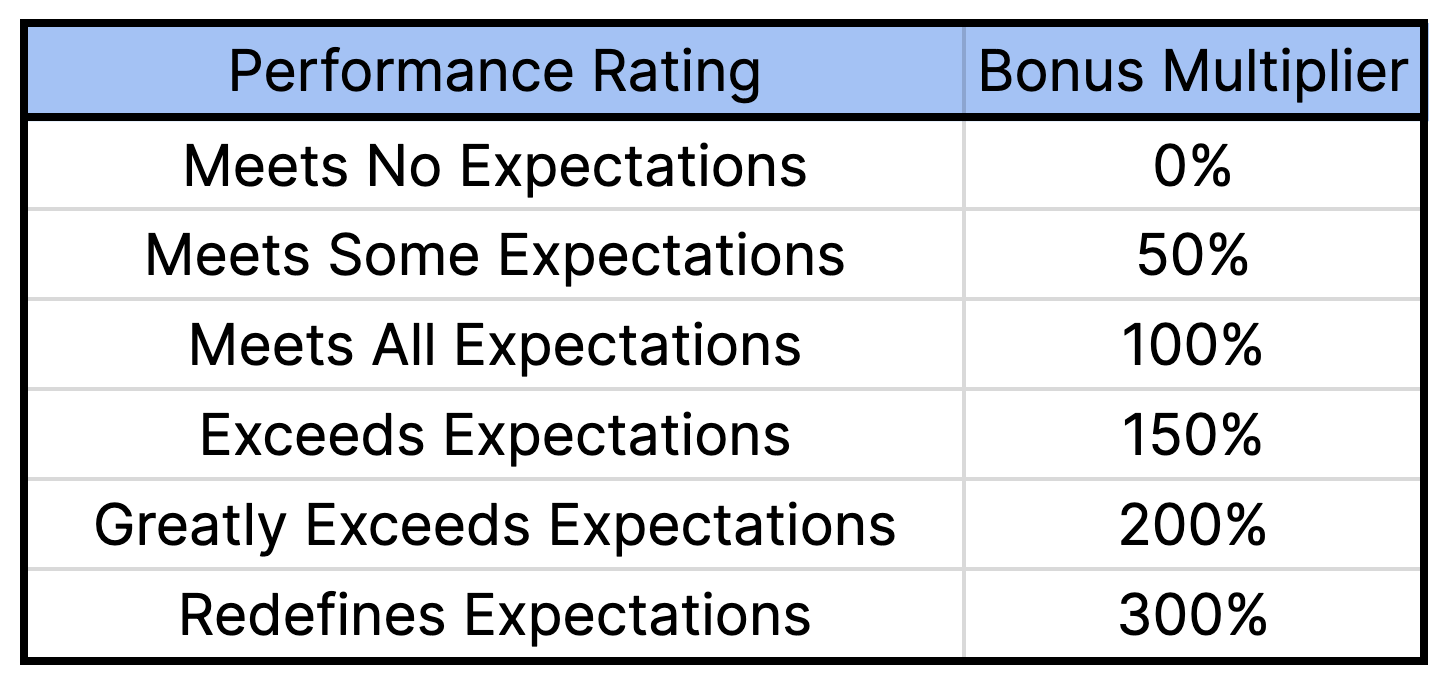Demystifying the performance review process

As I mentioned in my post about writing your self review, for many it's the season of performance reviews. I was recently part of a meeting where the process used at Personio was being explained, and it occurred to me that early in my career I had very little understanding about how the process worked at most companies. If I did, I probably might have approached it slightly differently, so for those who similarly don't know the process, let me offer some insights from my time in the technology industry.
Step 1: Self and Peer Reviews
This is the first stage beyond some kind of planning at the leadership level, and involves the most people, because it involves the entire company. Most companies give this a few weeks, but of course almost everyone leaves it until the minute.
In this stage, you're writing three types of review - a self review, a review of your manager (an upward review), and some number of peer reviews. This is also sometimes referred to as a 360 review.
Self review
In your self review, you write about your own achievements, as well as areas where you could possibly grown over the next 6/12 months. I've talked about it a good bit in the linked article so I won't dwell on it too much beyond reminding you that this isn't a place to be humble. You've presumably worked hard, make sure to celebrate your progress.
Upward reviews
The upward review is your chance to provide feedback about your manager. It is not always shared directly with manager, but could be. Instead it goes to your manager's manager. The questions will usually focus on how your manager is helping you with your career, leading your team and help you to achieve your goals.
Peer reviews
This is probably the most difficult part of the process - writing about your colleagues. I've two pieces of advice here.
First, be honest. I know it's tempting to embellish when talking about your co-workers, and there's a certain amount of selection bias in terms of who'll ask you to contribute a review, but there's a book called "Radical Candor" you can read which discusses the benefits of being direct and honest in feedback.
Secondly, don't expect to respond to all of them. Depending on the size of your company, you may well get several requests, and you won't get to them all. If you have, you've likely not invested enough time in each of them to give good feedback.
Instead, what you want to do is prioritise them. Consider who you've worked closest with, what projects you worked on together, and whether you have meaningful feedback. Order the requests from most impactful to least, then allocate some time for yourself and get as many as you can done in that timeframe.
For what it's worth, I tell my teams they should respond to no more than three requests and politely decline the rest.
Step 2: Manager reviews
Well if you're an individual contributor, the good news is that you're pretty much done with performance reviews now. At least until the very end anyway.
This stage of the process involves all the people managers taking the peer reviews, your self review, and their own thoughts and distilling it down into a single review, along with a provisional rating. If you're being considered for promotion, they'll also likely flag this with leadership at this point.
Depending on the organisation, your manager might discuss the review with you now, but more often than not they won't, because it's not final and there is very little worse in a performance review process than a surprise for the person getting reviewed.
Step 3: Calibration
Good organisations strive to run a fair process, where everyone at an equal level is treated the same, meaning that an engineer on the mobile team gets assessed the same as an engineer on the databases team.
The primary way this is achieved is through "calibrations". Calibrations involve all the managers in a given department/squad/group pool their reviews and compare them. The managers will have meetings, where they have discussions like - "Oh I see here you gave Susie an exceeds rating for X. I gave John on my team a meets rating for similar work. Could you explain your thinking, because one of us must be wrong".
The idea is that at the end of this process, everyone gets equal reward for equal work, because the whole point is to minimise bias. It's not perfect at it, but it's basically the performance management version of the software principle that "with enough eyes, all bugs are shallow". So once all the calibrations occur, ratings go up the org chart until they hit the leadership team, usually pretty aggregated, then those ratings are confirmed and filtered back down.
Having said that, this is also usually the stage where the idea of a "forced curve" starts to be discussed. If you're unfamiliar with this, it's the process whereby someone in leadership starts to question if a given group has "enough" people at each rating level, and suggests that maybe someone needs to be dropped down a level. If it's an actual forced curve, managers will be given allocations. So say your team has ten people on it, then some percentage of the team will have to get the lowest grade possible, regardless of their performance.
Most technology companies nowadays will tell you they don't do a forced curve, but most will have a performance curve they expect, and if a large enough cohort doesn't match that curve, they're going to start tweaking the ratings until it does.
Step 4: Final changes to your review
It's rare that the review packet your manager wrote going into calibration will be exactly the same as the one coming out of the calibration. Sure, the level they recommended might be the same, but there's a chance that after seeing some feedback from other managers, they've refined their own thoughts about your review.
So at this stage, they'll probably tweak and redraft the review, but as I said, the final rating is locked. This is all about how they convey your review to you.
Step 5: Delivering the review
This is the point where individual contributors come back into the process, because it's also the point where you find out how you've done.
This stage almost always consists of a 1:1 meeting. In fact if it doesn't, something's probably gone really wrong. In this meeting, your manager will share the results of your review with you. That review should have a section about past performance, a discussion of areas for growth (and how the organisation will help you with that growth), and finally the actual rating, which is usually somewhere on a scale from "you are not doing anything expected" to "you are vastly exceeding our expectations".
The impact of this rating can vary from company to company, but it's pretty standard for it to have a financial rating like a better pay rise, or larger bonus, plus it also gives another data point for demonstrating a trajectory towards promotion.

Speaking of promotions, this is also usually where you'll find out if you've gotten a promotion, as most companies pretty logically tie promotions to outstanding performance at your current or next level, which has just been reviewed, so they have all the relevant data fresh.
And that's it for performance reviews. Congratulations, because if you've gotten to this point in the process, you're done for another cycle. And in the next cycle, something will likely change about that process. I don't know why, but performance cycles seem to be one thing that folks in organisations like to fiddle with, and they're also usually universally dreaded by ICs and Leaders alike, which is kind of a shame, because they're important to your growth. But I don't know of any organisation that has this process perfect. Hence I guess the constant tweaking. Maybe the next iteration we'll get it right. Right?




